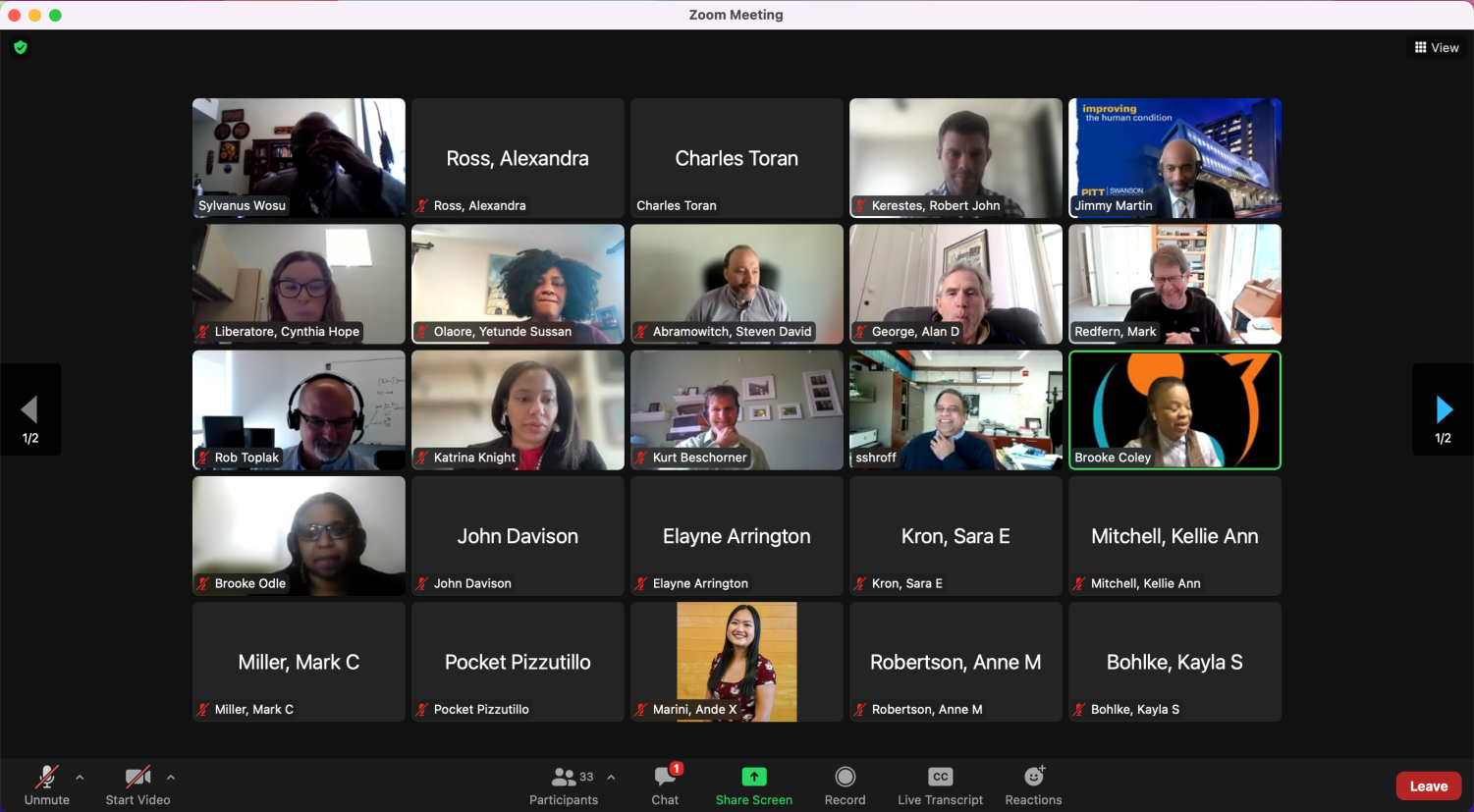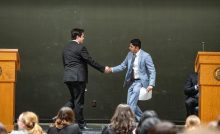Black engineering alumni discuss highs, lows of Pitt experience


Swanson School of Engineering’s Office of Diversity held a panel discussion on Tuesday with Pitt alumni titled, “The Blue, Gold & Black: A Reflection on Engineering Experience at Pitt” in celebration of Black History Month.
When Pitt alumna Elayne Arrington talked to her first cousin once removed — a current Pitt student who will graduate this year — about his college experiences, it wasn’t his academic performance or his computer engineering degree that stood out to her the most.
It was the fact that he was able to make friends in college, unlike her.
“I think what struck me most was that he has friends and acquaintances,” Arrington said. “He has lifetime relationships that he has made in the Swanson School of Engineering. And regretfully, I don’t have anything like that.”
Arrington, who became the first-ever Black female graduate from Pitt’s engineering school in 1961, spoke at the Tuesday event titled “The Blue, Gold & Black: A Reflection on Engineering Experience at Pitt.” The Swanson School of Engineering’s Office of Diversity held the panel discussion with Pitt alumni in celebration of Black History Month.
Arrington said she faced a culture of isolation as a Black woman studying engineering, and hoped others that came after her would not face the same marginalization.
“It was a culture that made me feel isolated and ignored,” Arrington said. “In my engineering courses, I had no one to work with and no one to talk to. I guess that’s just called marginalization. And that above all was what I hoped that no one after me would have to experience.”
Katrina Knight, an assistant professor of bioengineering and the panel’s moderator, asked the speakers to share what drew them to Pitt and their experiences with engineering.
Throughout Arrington’s time at Pitt, she said she suffered not only racism, but also sexism.
“It was a time when racial discrimination was certainly prevalent, but I guess I would say that in some ways, it was open, but in other ways, it tended to be rather covert,” Arrington said. “Yet it was a time when gender discrimination was very overt. And of course, that means that we African American females have suffered from intersectionality, the stacking or compounding of barriers or biases.”
The University later created the IMPACT program, which ran from 1969 to 2002. The six-week program was created to encourage minority and financially disadvantaged engineering students at Pitt. The Pitt EXCEL and INVESTING NOW initiatives later replaced the program.
Charles Toran, who graduated from Pitt in 1982 with a bachelor’s degree in mechanical engineering and again in 1991 with an MBA, said the IMPACT program provided him with lifelong friendships and connections that he maintains to this day.
“I graduated from the mechanical engineering program, and some of my best friends [that I graduated with], I’m still in touch with them on a regular basis,” Toran said. “Before COVID, we were getting together for an annual golf trip. In fact, we plan on resuming that again this year. They’re just lifelong friends.”
When it came to choosing where she would get her doctoral degree, Brooke Coley, who received her bioengineering Ph.D. from Pitt in 2010, said she was between a few schools at first. But at Pitt, she said she felt like there were people who “cared beyond the paper,” which was the determining factor in choosing Pitt.
“It was that there would be some people there that had my best interests at heart and would see me through to the finish line, and that was what they signed up to do and what they did for that time period,” Coley said.
While studying engineering at Pitt, Arrington said she didn’t have any Black female engineers to look up to as role models — at least, not any that she knew existed at the time.
“You’re probably familiar with Katherine Coleman Goble Johnson, from the movie ‘Hidden Figures,’ and I certainly wish that I had known about her when I was a student at Pitt or even when I worked as an aerospace engineer at Wright-Patterson, and I know she would have been my role model,” Arrington said.
Toran said his role models in college weren’t the engineers already working in the field, they were the seniors at his own school.
“Especially my junior year when I started to struggle a little bit for the first time, just being able to see seniors who were close to graduating and about to graduate, and it seemed like they had everything together, that was a real inspiration for me,” Toran said.
Brooke Odle, a 2006 Pitt alumna with a bachelor’s in bioengineering, said her experiences at Pitt helped her realize how each student or engineer brings their own background and perspective to each problem and the importance of staying true to oneself.
“One of the things that I learned being at Pitt was, you know, all of those experiences that I had, it was important for me to just try new things, but to also be true to myself,” Odle said. “And I think for Black engineers, we bring all of who we are, wherever it is that we go, and so the perspective that we bring to coming up with solutions for problems or extending purposes of technology — it’s all these things that shape us.”
Arrington’s advice for current Pitt engineering students, six decades after her own graduation, centered on three C’s — curriculum, culture and community.
“As I look back at the entire journey, I see it all as a matter of curriculum, culture and community, and I would tell any student now starting on such a journey that you have to be able to master the curriculum, you should challenge the culture and you should embrace the community,” Arrington said.
Recent Posts
Notes From an Average Girl // Notes on Book Banning
In this edition of Notes From an Average Girl, senior staff writer Madeline Milchman writes…
To Be Honest // Yup, it is that damn phone
In this edition of To Be Honest, staff writer Evin Verbrugge writes about her phone…
Meaning at the Movies | Portraying Toxic ‘Adolescence’
In this edition of Meaning at the Movies, staff writer Lauren Deaton explores the mini-series…
Opinion | Climate change requires radical, immediate action
Contributing editor Emma Hannan talks about the effects of climate change and the actions cities…
Jaland Lowe enters transfer portal, becomes fifth Panther to jump ship
On Tuesday morning, it was announced on X that Pitt sophomore guard Jaland Lowe was…
College Democrats and Republicans debate pressing political topics
Around 100 students gathered to watch Pitt’s College Democrats and College Republicans debate a variety…


